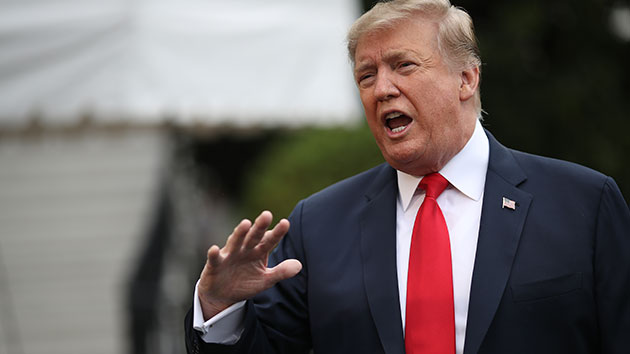
Win McNamee/Getty Images
 Win McNamee/Getty Images(WASHINGTON) — For the third year in a row, President Donald Trump is shunning the annual White House Correspondents Dinner for a campaign rally, his first since the release of special counsel Robert Mueller’s report into Russian interference in the 2016 election.
Win McNamee/Getty Images(WASHINGTON) — For the third year in a row, President Donald Trump is shunning the annual White House Correspondents Dinner for a campaign rally, his first since the release of special counsel Robert Mueller’s report into Russian interference in the 2016 election.
The president will rally with supporters in Green Bay, Wisconsin, for what his re-election campaign says is his 18th rally overall in the state since he announced his first presidential bid in June 2015.
Trump’s victory in Wisconsin in 2016 marked the first time a Republican presidential candidate won the state since the mid-1980s, and will be hotly contested in 2020 as Democrats aim to re-build the so-called “blue wall” of Midwestern states that helped propel the likes of Barack Obama and Bill Clinton to victory in their presidential bids.
“President Trump looks forward to sharing the successes of his administration with the great people of Wisconsin,” Michael Glassner, the chief operating officer of Trump’s re-election campaign, wrote in a statement released earlier this month announcing the rally. “Under President Trump’s leadership, paychecks are now growing twice as fast for those in the bottom half of the income spectrum. Unemployment has hit generational lows, and the U.S.-Mexico-Canada trade agreement will open Canadian dairy markets to farmers all across Wisconsin.”
However, 2018 was a banner year for Democrats in Wisconsin, when the party swept all statewide elections and unseated Republican Gov. Scott Walker, who was seeking a third term in office but was defeated by Democrat Tony Evers.
In response to Trump’s visit, Wisconsin Democrats plan to hold a “Rally for the People” Saturday morning led by the state’s 32-year-old African-American lieutenant governor, Mandela Barnes.
The victories in Wisconsin and Michigan, where Democrats flipped the governor’s mansion and two congressional seats, underscore the importance of both states for Trump’s re-election prospects — and the difficult political terrain he may encounter in 2020.
The president’s rally will also offer a look at what is likely to be Trump’s most sustained and direct response to Mueller’s report, and the subpoenas from Democrats on Capitol Hill, which continue to loom over his presidency.
In the wake of Mueller’s report, Trump has continued to rail against the special counsel’s investigation, tweeting earlier this week that it was “‘composed’ by Trump Haters and Angry Democrats.”
Ultimately, the special counsel’s office did not find sufficient evidence to suggest that members of the Trump campaign or anyone associated with it conspired or coordinated with the Russians. The report made no conclusion, however, on the matter of possible obstruction of justice by the president.
Despite Mueller’s detailed findings into Russian meddling, Trump’s senior advisers maintain it was the candidate’s message that ultimately resulted in his 2016 upset victory.
“Donald Trump won — we didn’t need WikiLeaks. We had Wisconsin. He won because he was the better candidate with a better message,” Kellyanne Conway, counselor to the president, told ABC News’ George Stephanopoulos on This Week last Sunday.
The rally will be Trump’s third campaign event this year.
The president has held re-election rallies so far in El Paso, Texas, and Grand Rapids, Michigan, as his campaign ramps up to take on whoever emerges from the field of crowded Democrats that swelled to 20 this week with the official entry of former Vice President Joe Biden.
Copyright © 2019, ABC Radio. All rights reserved.